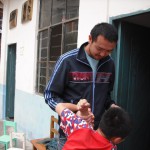Former tearaway, lecturer Li Chun-hong now inspires and serves
By Tiffany Tsim
In a lecture hall filled with laughter, a man standing at more than 1.9 metres tall gives a lecture to his class of enraptured humanities students. Li Chun-hong is a lecturer at the Chinese University of Hong Kong’s (CUHK) General Education Department and, at 35, he is the picture of respectability. But as a child he very nearly went off the rails and joined the triads.
Throughout Li’s childhood, his mother spared much of her time taking care of his intellectually disabled younger brother. His father worked as a seaman and only saw his family once a week. Li and his older brother were pretty much left to their own devices and they shoplifted from supermarkets, stationary shops and toyshops when Li was just in primary two. He would also get into frequent fights in the streets of Mong Kok where the family lived.
Li ran with a bad crowd, hanging around with gang members who considered him one of their own. But although Li stole, lied and fought, he still believed he was a good person. “When I was with the triads, I insisted on stealing from the chain stores only. I never shoplifted from small shops,” explains Li. “And I gave [the goods] to the foodless!”
He attributes this to the influence of his mother who he describes as gracious and kind-hearted. Despite the complex circumstances of her family, she never grumbled and complained. However, she was strict with her sons, and would beat Li when he did something wrong.
The turning point in Li’s life came when he was in secondary one. He defended a girl who was threatened by a triad from a rival gang. As a result, he was badly beaten up in a revenge attack and ended up in hospital. News of the incident spread fast and caused a scandal in his school and his family.
“It was the first time I saw my mum crying,” Li says. “She did not utter a single word.” Her silence was more damning than the most severe tongue-lashing. Li recognised how disappointed and helpless she felt at that moment. He started to reflect upon his past. “I’m a good person but why do I let myself become scum?” he asked himself. Li resolved to change.
During the summer holiday of secondary two, Li quit swearing, “I [used to] swear a lot. Every sentence I spoke included a four-letter word,” Li says. He also avoided his former gang friends for the entire holiday. Instead of hanging out with them, he picked up a new hobby, basketball, to pass the time during his holiday.

Playing basketball helped him to stay motivated to be positive. He decided that people needed to have a goal and realised that education would give him more chances in life. The former tearaway became a diligent student who crammed for the public examinations.
The hard work paid off and, in 1998, Li was admitted to CUHK to study for a degree in religious studies. He says he was fascinated by humanities subjects, such as religious studies, anthropology and philosophy, because he was interested in interpersonal relationships. The majority of religions advocate equality and human dignity regardless of people’s social class or if they are disabled.
After completing his undergraduate degree, Li stayed at CUHK to pursue graduate studies, earning a PhD in religious studies in 2010. He says that apart from imparting knowledge, his teachers at CUHK inspired him to be a good teacher. Several professors helped him to ease the financial burden of tuition fees by recommending part-time student helper jobs and lending him money. They would often have tea or breakfast with students after class. They discussed movies, literature and politics. “Perhaps these are irrelevant to the lessons. But this is life education,” Li says. “I always feel that having afternoon tea is the real lesson time.” He was encouraged to be more conscious about society and politics.
After getting his PhD, Li did not race to start his career. Motivated by his belief in equality and the dignity of human beings, he decided to throw himself into volunteer work. After sending letters and emails to different charities, he was invited to work for a centre for street children in Kunming.
He worked from morning to night to serve the children. In the morning, he organised activities and tutorials. In the evenings, he supervised the children who stayed at the centre. Li and his colleagues also conducted occasional outreach services for street children and brought them to the centre.

As he believes everyone is born equal, Li prefers to “walk alongside” rather than to “serve”. He accompanied the children as their buddy. “I lived where our children lived. I ate what they ate,” he says. “They accepted me in a very short period of time because they knew I was not superior to them.” As a former ruffian himself, he understood the children better than most of his colleagues, some of whom were bullied by the children and left in tears.
Li used his own personal experience to give the children hope, to encourage them to have faith in themselves and be good people. “‘I don’t expect that you [the street children] will change because of anything I’ve given to you. But I hope that at least once in your life, you know that you were loved,” Li says.
Li struck up a particularly close friendship with a 12-year-old called Bao Bao, a stubborn and smart boy, who reminded him of his younger self. Li thought Bao Bao could have a promising future if he went back to school. But one day, six months after his arrival at the centre, Bao Bao’s father took him away without informing the centre. Li was frustrated, “because you know it is the end of his future,” he explains. After he left the centre, Bao Bao ended up back on the streets and stopped studying.
To Li’s surprise, he received a message from Bao Bao a year later. It said simply, “I miss you”. Although Li said he never expected any return from the children, the message touched him deeply and was the greatest gift he could receive. “Everyone is equal. I believe everyone should love and be loved. This is a basic human right,” he concludes.
In 2011, after working for a year in the Kunming centre, Li joined a project taking care of Aids patients in Dali because he wanted to explore different kinds of service. He and his colleagues visited people with HIV and Aids in hospitals and villages, looked after the patients’ families and offered psychological counselling to affected children. Li was present when one of the patients, Ms Yan, died.
Once the doctor certified her death, a nurse told Li and his colleagues to remove her body as soon as possible. When Li informed her family members of her death on the telephone, their response was simply, “burn it.” The heartless reactions of Ms Yan’s family and the nurse showed how people in the villages discriminated against people with HIV and Aids.
Li believes that everyone should die with dignity. So he and his colleague cleaned Ms Yan’s body and changed her clothes. Nurses in protective clothing came over and asked Li to remove Ms Yan’s ventilator with his bare hands. He struggled for a while because he was afraid of infection. But he overcame his fear, and removed it carefully while upholding his belief in equality for all humankind. “This was the first time I sanitised a body, the first time I held a body, the first time I saw the darkest sides of people,” Li says.
For Li, Ms Yan’s death, and that of other rural Aids patients, set them free from pain. “You [Aids patients] are being discriminated against every day. It is ridiculous,” he says.
After two years of volunteer work in the Mainland, Li returned to Hong Kong and began teaching at CUHK. But he has not forgotten the disadvantaged in mainland China and has raised funds to support the living expenses of underprivileged university students in rural villages.

It is said that “charity begins at home” and in 2014, Li decided to serve local society by starting a scheme to offer poor students jobs giving free tutorials to children living in subdivided flats. He raised the money to pay the university students himself. “One sum of money can help two families,” he says. Li hopes the tutors can be role models for the children and show them that poverty does not have to stifle their future.
As a teacher, Li has never forgotten the nurturing provided by his compassionate professors. Just like he did with the street children, he treats his students as his equals. He chats with those who are lost and “walks alongside” them to help them find their direction.
His values, and his example, often touches those around him. Some of his friends have invited Li to volunteer with them in China; some have donated to charities. One of his students, inspired by his experiences, volunteered at Mother Theresa’s Mission Charities in Kolkata.
“If you believe in something, you have to prove it with how you live your life,” Li says.
Edited by Donna Shiu











































